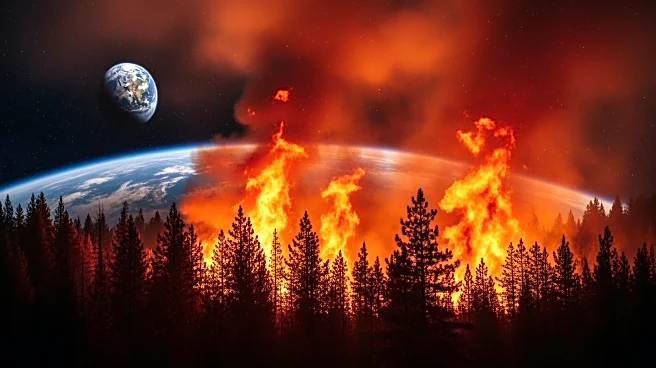What's Happening?
The World Meteorological Organization (WMO) has reported a record increase in atmospheric carbon dioxide levels in 2024, driven by emissions from wildfires and a decline in the Earth's ability to absorb
carbon. The Amazon rainforest experienced unprecedented wildfire emissions, exacerbated by the El Niño phenomenon, which led to drought and high temperatures. This surge in CO2 levels represents the largest yearly increase since modern measurements began in 1957, surpassing the average increase of 2.4 parts per million (ppm) in the previous decade. The WMO's Greenhouse Gas Bulletin highlights the impact of human activities and wildfires on the planet's climate, with CO2 concentrations reaching levels not seen in human civilization.
Why It's Important?
The increase in CO2 levels is significant as it contributes to global warming and extreme weather events, causing thousands of deaths and billions in economic losses annually. The WMO emphasizes the need for reducing emissions to ensure climate stability and economic security. The report raises concerns about the diminishing effectiveness of natural carbon sinks, such as oceans and forests, which absorb about half of the carbon emitted by human activities. As temperatures rise, these sinks become less effective, potentially accelerating global warming. The findings underscore the urgency for policymakers to implement measures to curb emissions and protect natural ecosystems.
What's Next?
The WMO calls for sustained and strengthened greenhouse gas monitoring to understand the dynamics of carbon sinks and their impact on global warming. Researchers suggest that fossil fuel emissions may have peaked last year and could start declining, but massive fires might offset this decline. The report urges governments to take more steps to reduce emissions and protect natural systems, which are crucial allies in tackling climate change. The upcoming U.N. climate conference will likely address these issues, with a focus on achieving the goals set in the Paris Agreement.
Beyond the Headlines
The report highlights the ethical and environmental implications of the current trajectory of carbon emissions. The potential weakening of natural carbon sinks poses a long-term threat to climate stability, necessitating a reevaluation of global strategies to combat climate change. The findings also stress the importance of international cooperation in addressing the root causes of emissions and implementing sustainable practices.









